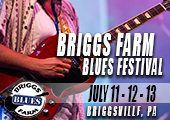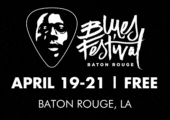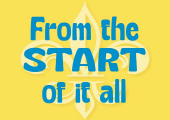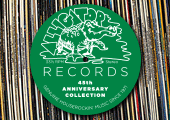COREY HARRIS
 The Insurrection Blues
The Insurrection Blues
M.C. Records – MC-0089
Corey Harris, who has focused mostly on exploring his music’s Africanist roots in recent years, returns to the “folk” blues sound with which he first made his mark. From the first track—Twelve Gates to the City, a spiritual often associated with the Rev. Gary Davis (whose sanctified rasp he invokes with almost eerie verisimilitude)—it’s clear that he’s intent on summoning the spirits of the ancestors to join him—and us—in the struggle to believe in, and possibly work toward attaining, a more just world and a better life.
That’s not to say that most of the material here is outwardly “political.” Whether he’s delivering standards like the aforementioned Twelve Gates or a classic from the oeuvre of Charley Patton (Some of These Days), Skip James (Special Rider Blues), or Blind Blake (That Will Never Happen No More); re-imagining a traditional Malian theme (Toubaka, Sunjata); or spinning out a jubilant tribute to the Piedmont blues tradition (his own Afton Mountain Blues, featuring a crisp, dancing harmonica accompaniment from Phil Wiggins), Harris makes it clear, without ever having to say it in so many words, that the celebratory spirit of this music and the liberatory passion that fuels his own worldview and activism are inextricably linked. As poet Toi Derricotte has reminded us: in times like ours, joy is an act of resistance.
When he takes on more overtly political and social topics, Harris is even harder-hitting. Mama Africa finds him summoning venerable images of bondage and escape (“Where you gonna go when you cannot stay”) and infusing them with revolutionary fervor (“Will you run and hide, will you stand and fight for what is right / On that day”)—much of which sounds like a nod to the late Nina Simone’s epic Sinnerman, updated and infused with new urgency.
It’s all prelude, though, for the title track, which serves as the album’s centerpiece. An Interlude, apparently taped at the Trump-incited January 6 insurrection attempt in Washington, DC, sets the tone; Harris then comes in with a fierce denunciation of both the rioters and the living legacy of American violence and moral blindness they represent. Invoking Malcolm X’s famous (and often misunderstood) comment that the 1963 JFK assassination was merely a case of “the chickens coming home to roost,” he makes it clear that if “mainstream” (i.e., white) America was shocked or terrified by what happened “on that day,” they have nothing to blame but their own disingenuousness, and nowhere to look but within their own history—and their own souls—to realize from whence those events sprang, what they portend, and how—if it’s still possible—we might still be able to confront the reckoning they demand, and then do the work necessary, to set things right.
—David Whiteis
BUFFALO NICHOLS
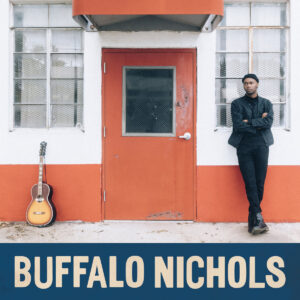 Buffalo Nichols
Buffalo Nichols
Fat Possum – No #
Carl Nichols is a throwback. For one thing there’s the nickname, which is not only in the tradition of such other animal totems as Howlin’ Wolf and Kingfish, but, as the numismatists among our readers already know, is a reference to the bison depicted on the obverse side of a coin commonly known as an Indian Head nickel which was minted from 1913 until 1938. Further, the young guitarist has compiled a travelogue in his 30 years that is reminiscent of such peripatetic blues troubadours as Big Joe Williams—born in Houston, raised in Milwaukee (where he was intrigued by his mother’s blues records and cut his musical teeth at various church and rock venues), educated (formally and otherwise) in North Africa, Germany, and Ukraine, and recently settled in the musical incubator that is Austin, Texas. Too, with none of the eight tracks beyond 3:43, the 26-minute running time on this, his debut album, is more characteristic of vinyl than of CD, and then there’s the music itself. Although some might expect a measure of whimsy from a man who styles himself “buffalo,” there is absolutely nothing whimsical in Nichols’ music as displayed here, which is most accurately described by such adjectives as bleak, desolate, despairing, angry, and even cynical, evoking the intensity of the great pre-war bluesmen without imitating any of them.
Of the set’s eight selections, Nichols gets composer credits for all but two, primordial Mississippi bluesman Skip James’ Sick Bed Blues, where Nichols’ throaty rasp is a stark but effective contrast with James’ eerie tenor, and Another Man, an updated take on the old field holler, Another Man Done Gone, where he sings “no need to hide behind a white hood, when a badge works just as good.” The mood of the album is almost unrelentingly bleak, as evidenced by titles such as Lost and Lonesome, with the singer lamenting that he’s “been lost and lonesome since I left my mother’s home”; Living Hell, which poses the dilemma whether to “die and go to heaven or keep on living in hell”; or Sorry It Was You, where he closes the program singing “took a long look in the mirror, my eyes had turned devil red.” These are not the words of a happy man, nor are those of How to Love, where the singer realizes that his mistreatment of a lover had its roots in his own mistreatment by a former lover who was also mistreated, or Back on Top, where he makes plans to blow his meager bluesman’s pay by living like a king and queen for a night.
Musically, Nichols’ terse vocals merit descriptors such as smoky, gritty, and gruff, while his guitar work, including some superb slide, is heard both acoustic and amplified, with percussion added to good effect on several tracks (thunderously so on Back on Top), and violin (not fiddle!) with less success to another, the relatively sunny These Things. Robert Johnson, Furry Lewis, Muddy Waters, Bob Dylan, Eddie Turner, Otis Spann, Otis Taylor, and Joe Louis Walker are among the names that appear in my listening notes.
In its promotional material, Fat Possum, a North Mississippi label best known for its landmark albums by Hill Country bluesmen R.L. Burnside (1991) and Junior Kimbrough (1992), proclaims that Nichols is its first solo blues signing in nearly 20 years (since Kenny Brown in 2003?), and the singer himself is driven by the goal of taking the blues of the past into the future, or, put otherwise, to help today’s Black people hear themselves in the blues. This impressive, and surprisingly mature, debut album is a promising first step in the right direction.
—Jim DeKoster
ALLISON RUSSELL
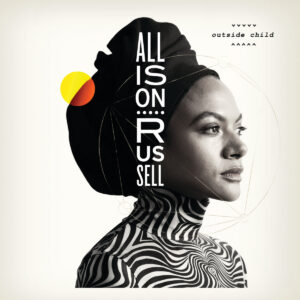 Outside Child
Outside Child
Fantasy – FAN001126
Before Montreal native Allison Russell gained renown as a member of Po’ Girl, Birds of Chicago, and Our Native Daughters (see LB #269), she endured a harrowing childhood of horrific sexual abuse at the hands of her stepfather. On Outside Child, her solo debut, the singer-songwriter, banjoist, and clarinetist courageously chronicles how she overcame her pain and sorrow with joy and love. That she is able to take this subject matter and create beautiful, cathartic music from it speaks volumes about her level of artistry and personal strength.
Co-writing the majority of the songs with JT Nero, her husband and musical partner in Birds of Chicago, Russell spares nothing as she tells her story. Montreal is a chanson d’amour for her hometown, where she was a teenage runaway; Persephone a gentle country ode to her first love, who sheltered her at night from her stepfather and the streets. She takes us along on her journey through the past as she achieves radical forgiveness and healing. “Blessings be upon the thief of my childhood . . . Oh my father you were the thief of nothing,” she sings on Joyful Motherfuckers, a loving duet with Nero.
Russell’s variety of musical influences—folk, blues, country, rock, gospel, and Celtic—commingle easily. Among those joining her in the studio are the McCrary Sisters, who provide backing vocals throughout—most effectively on the pulsing hymn 4th Day Prayer and the haunting All of the Women. The Runner, a driving rocker with harmonies by Yola, celebrates the redemptive power of music. The mist-shrouded Hy-Brasil, accented by Russell’s clarinet, sounds like an ancient Scottish ballad reborn. Her soprano voice, willowy and crystalline, contains multitudes. It powerfully swells and frays—but never breaks—on the pedal steel-driven The Hunters, then bottoms out in All of the Women’s banjo-blues moan.
On an album full of stunning songs, its heart and highlight is Nightflyer. Inspired by Gnostic poetry, the lilting country melody carries lyrics both haunting—“I’m a violent lullaby”—and jubilant—“I am the Love that Conquers All”—so exquisitely it brings tears.
This is a release of extraordinary power, depth, and beauty. Deserving of all the accolades it’s receiving—it’s been nominated for three GRAMMY Awards—Allison Russell’s Outside Child is in every sense an artistic and personal triumph.
—Melanie Young
MEMPHISSIPPI SOUNDS
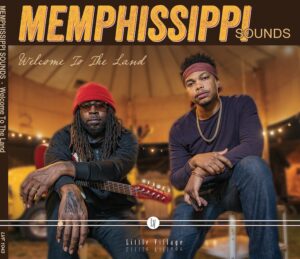 Welcome to the Land
Welcome to the Land
Little Village – LVF 1043
Damion Pearson, a.k.a. Yella P, is a music educator from North Memphis, Tennessee, who sings and raps, and plays harmonica and guitar. Cameron Kimbrough is a truck driver from Potts Camp, Mississippi, who sings and plays guitar and drums and happens to be the son of Kinney Malone and grandson of Junior Kimbrough. Together, they comprise Memphissippi Sounds. As attributed to Bobby Rush on the sleeve, “Tennessee and Mississippi, when you put them all together whatcha got? Memphissippi!” Or, as Pearson puts it, the dynamic duo offers a “custom blend of North Mississippi hill country blues, Memphis blues and soul, rock, pop, and hip hop.”
The set’s program presents Pearson and Kimbrough alternating the lead on the disc’s eight songs (a ninth track, High & Low, is considered an instrumental with spoken interjections). Opening honors go to Pearson, whose hard-driving vocal and wailing harmonica on Who’s Gonna Ride are booted along by Kimbrough’s propulsive beat—be sure to note how things cook even harder when Pearson changes his chant from “who’s gonna ride with me” to “I can’t breathe,” and captures a level of excitement not often captured with modern recording techniques. The Memphian is also up front on I’m Mad (“I’m mad, baby, but I’m not upset”), Crossroads (“I don’t know which way to go”), and the morning-after bedroom vibe of Saturday Morning, while Kimbrough takes over on Groove with Me, You Got the Juice, the cotton-patch swing of Go Downtown, and Look Out for the Wolf.
Little Village labelmate and producer Aki Kumar deserves kudos for bringing this project to fruition as a prime example of the music’s continuing vitality, and this set should be a must for fans of the Burnside and Kimbrough families.
—Jim DeKoster
DION
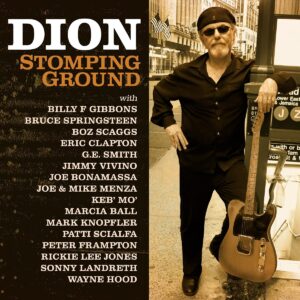 Stomping Ground
Stomping Ground
Keeping the Blues Alive – KTBA 92282
On some albums you can feel the spirit of the musicians emanating from the speakers, and the free spirit flowing among the musicians courses into the songs themselves, putting us in the studio with those making the music. Dion’s Stomping Ground is one of those albums. As he did on 2020’s Blues with Friends, the rock and blues icon invited a group of friends to join him to relax, to have some fun, and to make some damn good music.
Joe Bonamassa joins Dion on the album opener, Take It Back, a raucous, romping blues rocker that launches into the stratosphere on the wings of Bonamassa’s stinging lead runs. The song sets the bar high for the rest of the album, but every other song just takes up the challenge and raises that bar just a little more. The prowling and growling rocker Hey Diddle Diddle features G.E. Smith’s piercing leads, while Mark Knopfler’s multi-note riffs and crystalline leads create a spacy atmosphere on Dancing Girl, evoking the ethereal movements of dancing with his guitar stylings. Sonny Landreth’s shimmering slide riffs carry Cryin’ Shame into the sonic stratosphere, while Boz Scaggs and brothers Joe and Mike Menza propel the roving rocker I’ve Got to Get to You, evoking urgency with their straight-ahead blues rock. Billy Gibbons brings his wide-open guitar-slinging to the swaggering My Stomping Ground, whose chorus gives the album its title and in which Dion tells the story of his journey from doo-wop to the blues. Patti Scialfa and Bruce Springsteen’s affecting vocals convey the light within the darkness in the poignant moodiness of Angel in the Alleyways, while Marcia Ball and Jimmy Vivino roll in the good times on I Got My Eyes on You Baby, driven by Ball’s Texas roadhouse piano. Keb’ Mo’ joins Dion for a shuffling cover of Jimi Hendrix’s Red House, turning in a new classic version of this old gem that rides along the layers of Mo’s dazzling slide guitar riffs. The album closes with a soulful jazz number, I’ve Been Watching, on which Dion and Rickie Lee Jones trade vocals; it far surpasses any duet that Stevie Nicks and Lindsey Buckingham ever put out. I’ve Been Watching is the highlight of the album.
Stomping Ground is just plain fun, and Dion and his friends deliver a collection of songs that slip into our souls and backbones and get us moving to their infectious grooves. Dion brings out the best in other musicians, and they bring out the best in him; these collaborations are matches made in rock and blues heaven, and we can hope that Dion and his friends get together for several more such projects.
—Henry L. Carrigan Jr.
ROY ROBERTS
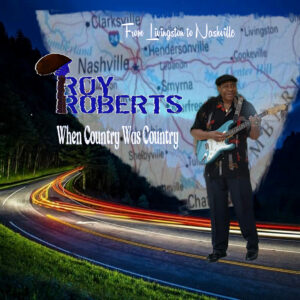 When Country Was Country
When Country Was Country
Rock House Records – RH 00502
Roy Roberts grew up surrounded by country music. The Grand Ole Opry and early morning farm programs on radio featuring bleary-eyed country pickers sailed through the air to his birthplace in Livingston, Tennessee, and when he moved with his grandparents to Park City, Kentucky, there was nothing but bluegrass music on the airwaves. So when Roberts’ rhythm & blues audiences dried up in the heat of disco mania in the late 1970s, he unsurprisingly pivoted to country music in order to preserve his business on the southeastern club circuit.
With the release of When Country Was Country, Roberts turns again to the country genre in which blues and rhythm & blues artists, all the way up to and including Bobby “Blue” Bland and B.B. King, have always worked with ease because they listened to the same hillbilly jamborees and record programs as everybody else in the radio South. However, this time Roberts revisits country music in gratitude rather than desperation, honoring the Charlotte-based music star and entrepreneur Arthur “Guitar Boogie” Smith who first suggested he record country music when disco caught fire.
Two newly recorded cuts open the set, featuring Roberts’ always tender vocals, worthy of Jim Reeves and Charley Pride, but the balance of the album dusts off prosaic cuts from his first country album recorded with Smith’s band, the long-out-of-print LP Country Star (1980), released on Roberts’ House of Roton Records. Back for an encore are two co-writes with Stax sensation Eddie Floyd who Roberts backed on tour in the headliner’s Knock on Wood days of the mid-1960s, slotted with Goodbye Walls, an answer to Reeves’ purring country smash of 1957.
The country, rhythm & blues tradition has only thrived in the years since Roberts first experimented with mixed ingredients, claiming critical successes such as B.B. King’s Love Me Tender (1982), Nashville’s Rhythm, Country & Blues compilation (1994), and the Gibson Brothers’ Mockingbird (2018). And it may not have seen the last contribution from Roberts, who turns 80 in 2022. “I write country music all day long just like writing blues because country music and blues are the same,” he said in a recent interview. “It’s sad stories, somebody-done-somebody-wrong songs.”
—Michael Streissguth
COLIN JAMES
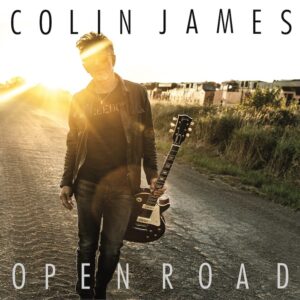 Open Road
Open Road
Stony Plain – SPCD1434
To follow his back-to-back cover collections, Blue Highways (2016) and multi-award-winning Miles to Go (2018), Colin James mixes things up for Open Road, his 20th studio recording. Joined by a coterie of longtime collaborators and a handful of special guests, the Canadian vocalist/guitarist blends some more new takes on beloved blues and rock favorites with a quartet of energetic original tunes.
The album’s title track, written by James and Craig Northey, paints a lonely but defiant drifter’s self-portrait: “When the sun goes down and leaves me hollow / I got you and stars to follow.” (Northey also lends guitar and backing vocals to a lush rendering of the Bob Dylan / Jim James composition Down on the Bottom.) Colin Linden joins James as co-composer of both the hard-belting There’s a Fire and bittersweet Raging River, where Linden’s stark slide guitar undergirds a moody tale of loss and regret. In far different spirits, When I Leave This House, a James collaboration with Tom Wilson, is a rockabilly-flavored blast, Jesse O’Brien’s barrelhouse piano kicking the party into high gear.
Open Road’s cover tunes offer an equally compelling panoply of musical atmospheres. Steve Marriner’s no-nonsense harmonica shores up James’ gutsy vocals on Otis Rush’s It Takes Time, while Steve Hilliam’s blaring saxophones and Norm Fisher’s concussive bassline bring sizzle to Albert King’s Can’t You See What You’re Doing to Me. James’ twanging guitar and smoky voice are a bracing old-school tonic on Tony Joe White’s As the Crow Flies, and for John Lee Hooker’s Bad Boy, the pinpoint precision of James’ single-chord phrases mesh with the barrel-chested thump of Geoff Hicks’ drums to appropriately lean-and-hungry effect. A touch of Dylan’s signature vocal lilt graces James’ breezy delivery of It Takes a Lot to Laugh, It Takes a Train to Cry; then, on Magic Sam’s That’s Why I’m Crying, Simon Kendall’s haunting organ offers James’ voice nowhere to hide from the pain.
For Doyle Bramhall’s Change It, a teasing recurrent James guitar phrase smartly evokes the caustic give-and-take of real-world romance. But there’s hope for the weary heart waiting in the Booker T. Jones / Eddie Floyd album closer, I Love You More Than Words Can Say. With its caressing tempo, Kendall’s churchified chords, and James’ earnestly aching passion, the track is a soul-nourishing oasis at the end of Open Road.
—Matt R. Lohr
JOHN MAYALL
 The Sun Is Shining Down
The Sun Is Shining Down
Forty Below Records – FBR-026
If The Sun Is Shining Down is destined to be John Mayall’s final album as has been rumored, suffice it to say he’s going out at peak form. That’s evident not only in the list of all-star musicians he’s enlisted for this latest opus—among them, Mike Campbell, Buddy Miller, Scarlet Rivera, Melvin Taylor, Carolyn Wonderland, and Jake Shimabukuro—but in both the force and finesse that Mayall himself exhibits throughout. Although his vocals sound a bit scratchier at times than they did in his earlier years—the man is 87 years old after all—his harp playing is as consistent as ever, both lyrically and expressively. The effusive dynamic and drive found in opening track, Hungry and Ready, and later, A Quitter Never Wins, clearly confirm that impression.
So too, the song selection measures up to Mayall’s usual standards, no small achievement considering the standard he’s set over the past 65 years. The majority are Mayall compositions, but the covers are well chosen, with Bobby Rush’s riveting I’m As Good As Gone (aptly underscored by a sizzling guitar undertow courtesy of Buddy Miller), Bernard Allison’s swinging Chills and Thrills, the easy lope of Roosevelt Sykes’ Driving Wheel, and Tinsley Ellis’ emphatic A Quitter Never Wins ranking among the album’s standouts.
Nevertheless, even these standards fail to blunt the impact of Mayall’s original offerings. Got to Find a Better Way serves up its share of optimism, presumably as an enticement to the stand-offish object of his affections, but also to a world that’s lost its way in the face of division and distrust. So too, the upbeat Deep Blue Sea shares the promise of a sunny respite at a time when isolation caused by the pandemic seems to be the rule. Likewise, the title track harkens back to his classic Blues from Laurel Canyon, an enthusiastic ode to his adopted California. (“I really hit the bullseye, the sun is shining on my face.”)
Even with a mighty instrumental arsenal behind him, Mayall makes it clear he’s still firmly at the fore. While Scarlet Rivera’s riveting violin work and Jake Shimabukuro’s seemingly effortless ukulele strumming add new elements to the mix, they’re fully integrated into the overall thrust of the music itself, ensuring no lag in terms of either tone or tempo. Not surprisingly, it’s the guitarists he’s recruited that strike the most urgent impression, but then again, that ought to come as no surprise considering the fact that Mayall, the unrivaled godfather of British blues, helped birth the talents of Eric Clapton, Peter Green, and Mick Taylor while at the helm of the earliest incarnation of the Bluesbreakers. When Shimabukuro takes the lead on One Special Lady, the impact is reminiscent of that band’s seminal sound in full flourish.
Ultimately, the new album is a tribute to the tireless tenacity of this unrivaled master of the form. The Sun Is Shining Down shows Mayall’s music remains as illuminating as ever.
—Lee Zimmerman
AMYTHYST KIAH
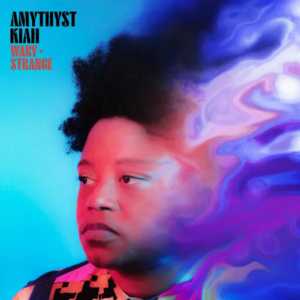 Wary + Strange
Wary + Strange
Rounder – 1166101237
When LB spoke to Amythyst Kiah in 2019, she had just released Songs of Our Native Daughters with Rhiannon Giddens, Leyla McCalla, and Allison Russell, and was preparing to tour behind the project (see LB #236). Black Myself, Kiah’s powerful statement of Black pride and self-love, opened the album, and it garnered the Chattanooga native attention and acclaim, including a GRAMMY nomination and a Folk Alliance International Award.
At the same time, she was writing songs for what would eventually become her third solo album. Produced by Tony Berg and featuring supporting artists such as Grant Dermody, Wendy Melvoin, Blake Mills, and Ben Sollee, Wary + Strange fuses Kiah’s love of alternative rock, old-time, and country music with her raw, introspective lyrics into a cohesive and thrilling whole.
“I have my own hand that feeds / So I don’t need what you think,” Kiah asserts gently but firmly on Soapbox, which opens and then closes the album in a reprise. Black Myself appears again here, this time more defiant, rocking hard with Mills’ guitars and Melvoin’s bass and peppered with samples by Berg. Hangover Blues is a righteous blues stomp, shot through with Dermody’s harmonica; Tender Organs a wailing, rocking blues on the destruction of drinking. Both are so masterful and assured, they could easily become modern blues classics.
Many of her songs deal with loss, despair, and trauma. Wild Turkey is an aching meditation on her mother’s suicide (“When your soul dies / You just can’t hide it / Everyone can tell / Oh Lord, will I ever feel / Right again”), Opaque a rueful reflection on love lost and denied (“She’d rather die than reach out for my hand”). Her rich alto voice can pack a knockout punch, bringing to mind at various times Odetta, Nina Simone, and Tracy Chapman. “Fracture me,” she wails over Berg’s crunching bass harmonica on Fancy Drones (Fracture Me), and you can almost hear the bones breaking. Then on the brokenhearted country waltz Ballad of Lost—“Someday you gonna find me, / Once ashes turn to doves”—her vocals melt into tender wistfulness.
With singular storytelling and performances to match, Amythyst Kiah’s Wary + Strange is the fruition of what Black Myself hinted at: a compelling artist with a charismatic voice, fully coming into her own.
—Melanie Young
CHUCK BERRY
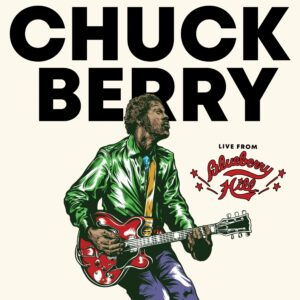 Live from Blueberry Hill
Live from Blueberry Hill
Dualtone Records – DUA22411
Neil Young’s famous lines “Rock and roll is here to stay / It’s better to burn out than to fade away” resonate loudly on this collection of live performances from the late father of rock ’n’ roll. Culled from intimate live performances at Blueberry Hill’s Duck Room—the room seats only 340 people—in St. Louis between July 2005 and January 2006, Berry may not be fading away, but he’s burning out fast. Maybe it’s the poor quality of the recordings, but he sounds a step behind on many of the performances. His piercing leads have lost nothing, but his ragged vocals ring tired and hollow. This album of live performances lacks the energy of his final studio album, Chuck, which was released posthumously in June 2017.
He’s joined on the album by his Blueberry Hill Band—daughter Ingrid Berry on harmonica, son Charles Berry Jr. on guitar, bassist and bandleader Jimmy Marsala, pianist Robert Lohr, and drummer Keith Robinson—and this tight ensemble dominates the shows with their energy and vitality. Sadly, Berry lacks the all-out dynamism of his heyday, and he runs through sets of his signature songs—Carol, Roll Over Beethoven, Rock and Roll Music, Sweet Little Sixteen, among others—almost listlessly. The album opens with a performance of Roll Over Beethoven that sounds more like Beethoven than rock ’n’ roll; Berry sounds out of breath most of the time, struggling to stay up with the band. Lohr’s barrelhouse piano on the bridge saves the day. Berry sings off key and behind the rhythm on Sweet Little Sixteen, struggling to keep up with the song. The medley Carol/Little Queenie lights the spark that Berry ignited so well when he duck walked across stages and fueled the energy of audiences to sing along; Robinson’s propulsive drumming carries this medley, and Berry finds his groove in the performance and sounds like the father of rock ’n’ roll we know and love. Berry catches that lightning in a bottle on a performance of Johnny B. Goode; he’s still breathless, but this live version raucously rocks with his characteristic driving rhythms and vocals.
Live from Blueberry Hill is for fans excited to have any new Chuck Berry they can get their hands on, but while Berry tries not to let rock fade away, he certainly sounds in these performances like he’s burning out.
—Henry L. Carrigan Jr.


